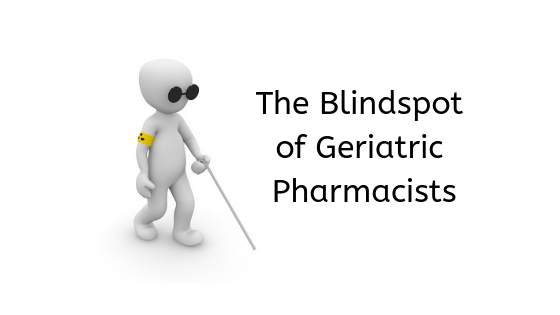Generalizations aren’t always the greatest, but I do feel that I’ve learned a lot from my experiences. As a geriatric/ambulatory care pharmacist, I feel that we (maybe more-so me) as pharmacists do sometimes have a blindspot. Let me explain.
Throughout school and in working with a large number of polypharmacy patients, I feel like I tend to have a bias towards medications. Medications (and over-medication) tend to be the enemy of a geriatric pharmacists. Medications can and do cause lots of problems. This is without question.
What I tend to forget about is the ramifications of undertreatment. Patients go to the hospital for CHF exacerbations, strokes, COPD exacerbations, and other conditions that can be prevented or at least reduced with the aid of medications. This is something I need to remind myself on a regular basis. Medicines can truly do a lot of good.
I think physicians (again generalizing) do a better job of recognizing the risks of under-treatment (or no treatment).
Physician, NP’s, and PA’s have a heavy focus on
I remember a poorly written recommendation by a pharmacist (fortunately not me) where the use of tamsulosin was questioned. The patient was not having adverse effects. The physician wrote something to the effect of “taking away this drug would cause acute urinary retention and likely hospitalization”. I think this demonstrates my point perfectly. The physician is significantly worried about the exacerbation of the condition while the pharmacist is worried about complications from the drug.
What do you think? Does our training lead us down the path of worrying more about the drug than the disease?
I’ve literally written thousands of medication recommendations. I’m not perfect but have learned so much. If you are looking for more real world information on writing medication recommendations, you can check out our 3 hour course.



Thanks for the reminder to look at our “blind spots” – it isn’t always about stopping or starting a drug either – I find myself “gravitating” to looking for certain medication over-use or errors and maybe not focusing on others (perhaps because I feel under informed about certain conditions and so stay in my “comfort zone”). I do try and use the STOPP and START criteria – especially ensuring my diabetic patients have Aspirin, ACE/ARB and Statin (although the evidence on Aspirin seems to be changing, so more confusion!). But I don’t always know what the physician is thinking either (why is that female patient on tamsulosin long term?) – which is why our relationship with the other practitioners is so important.
Thanks again – always enjoy your posts.
I agree that our training may be to drug focused and disease focused. As soon as you make the patient the centre of the treatment plan the picture changes drastically. Before writing a report a patient consult is imperative.
Our training leads us to look at the drug, not the patient. Changing our focus to the person and their needs is the mind-shift that has to occur.
The balance between risks and benefits in accordance with age ,sex ,co-morbid conditions.
we need to make this more methodical and /or even mathematical.
Absolutely, pharmacist are too focused on rules and when this happens you do this. Instead of looking at each patient individually. When your on this drug, you always must get this lab. When you see a Beer’s drug it must always be discontinued.